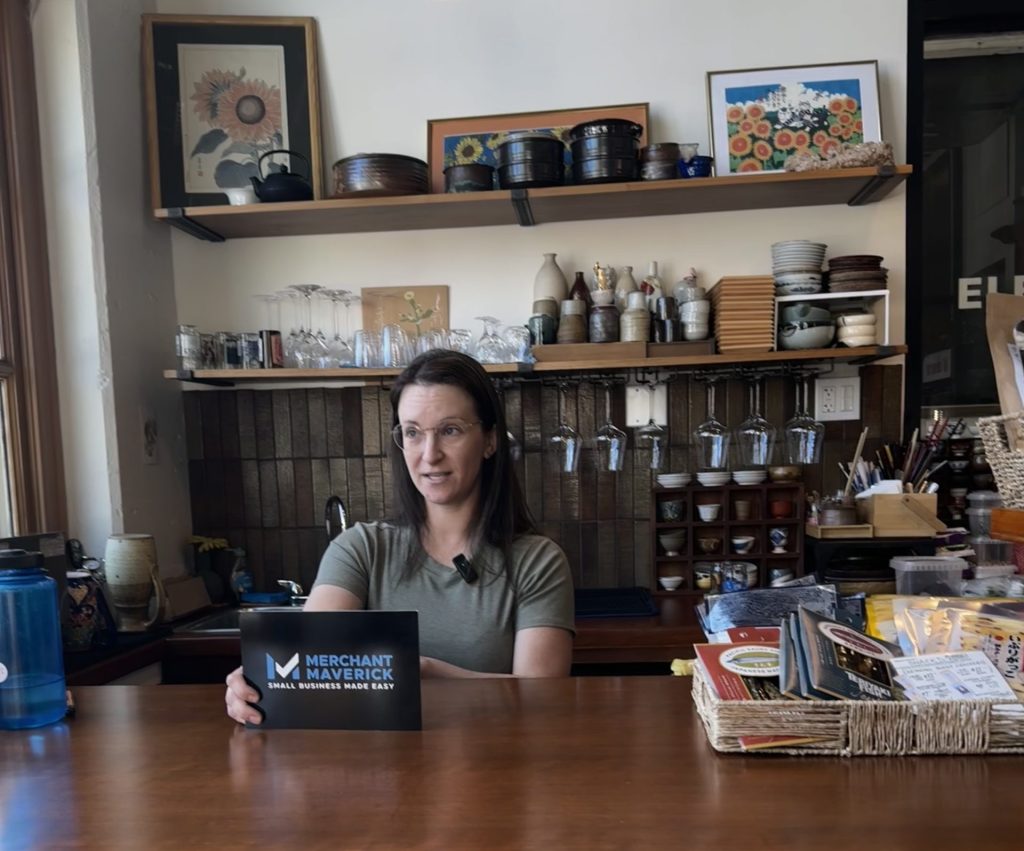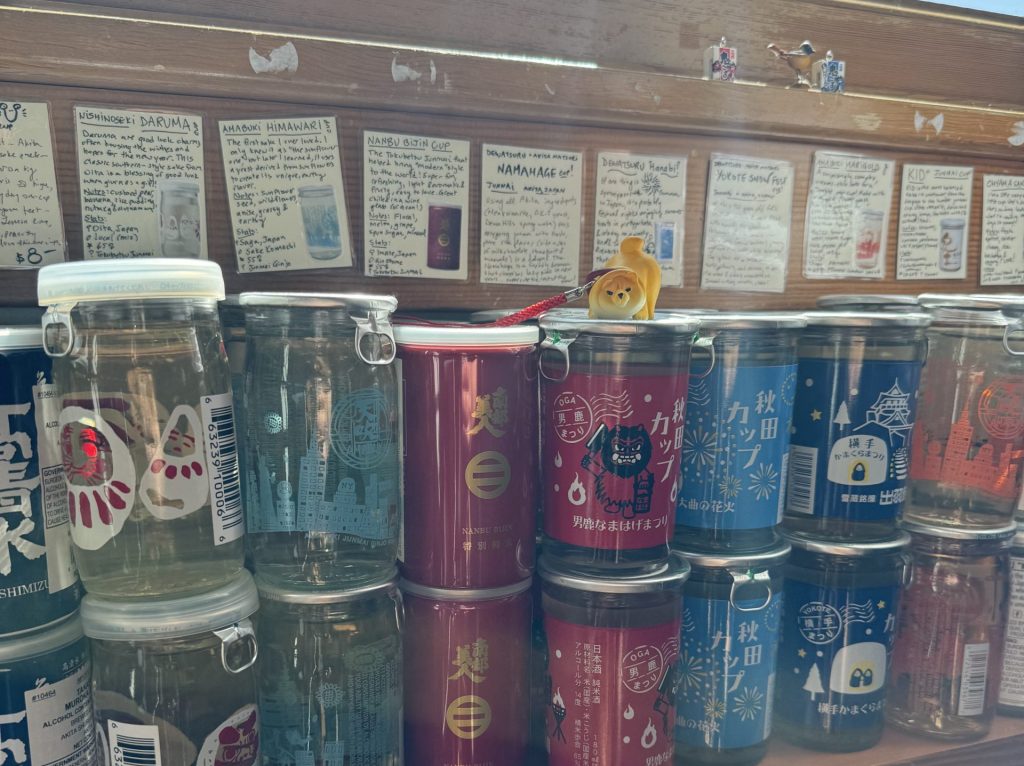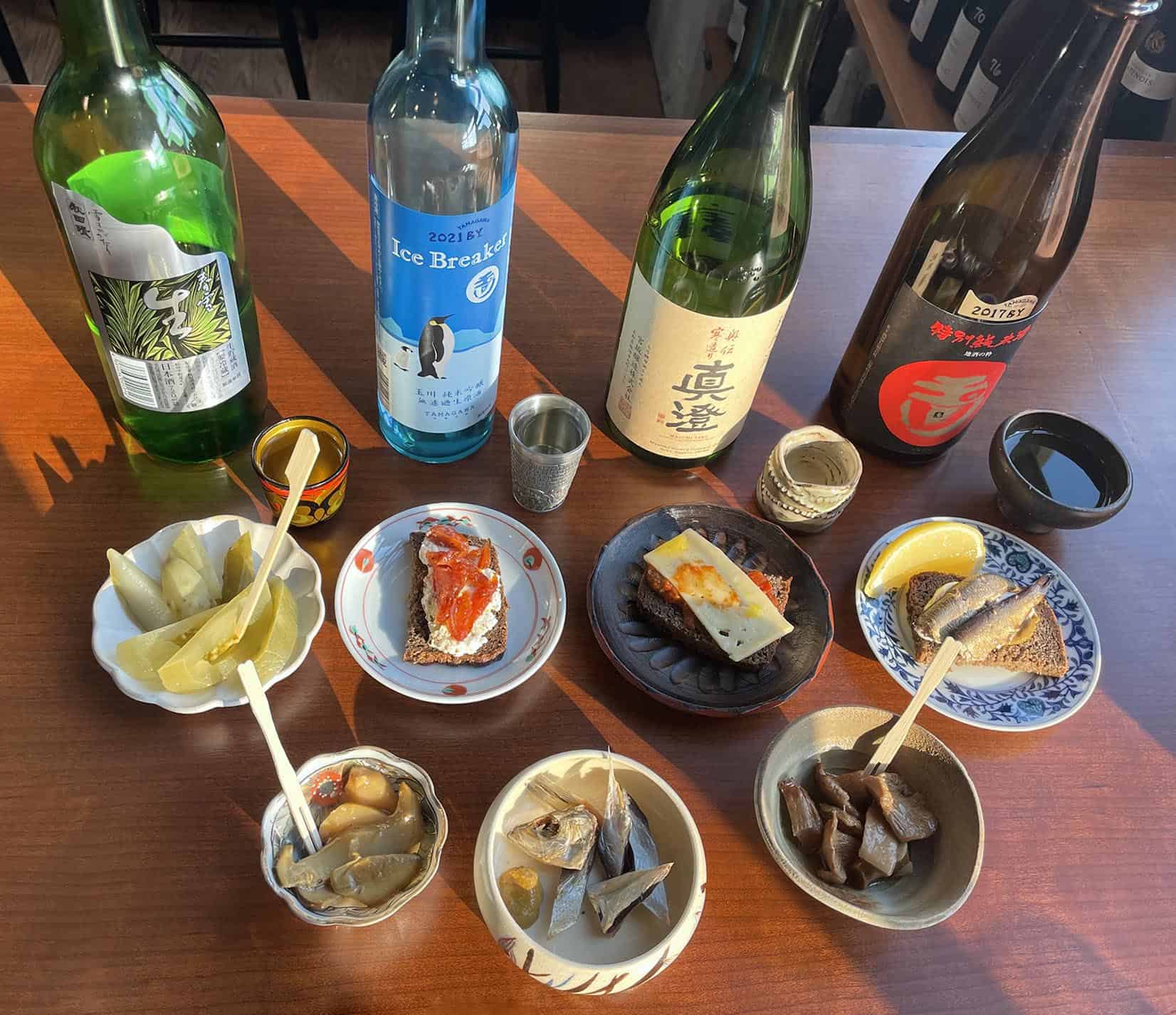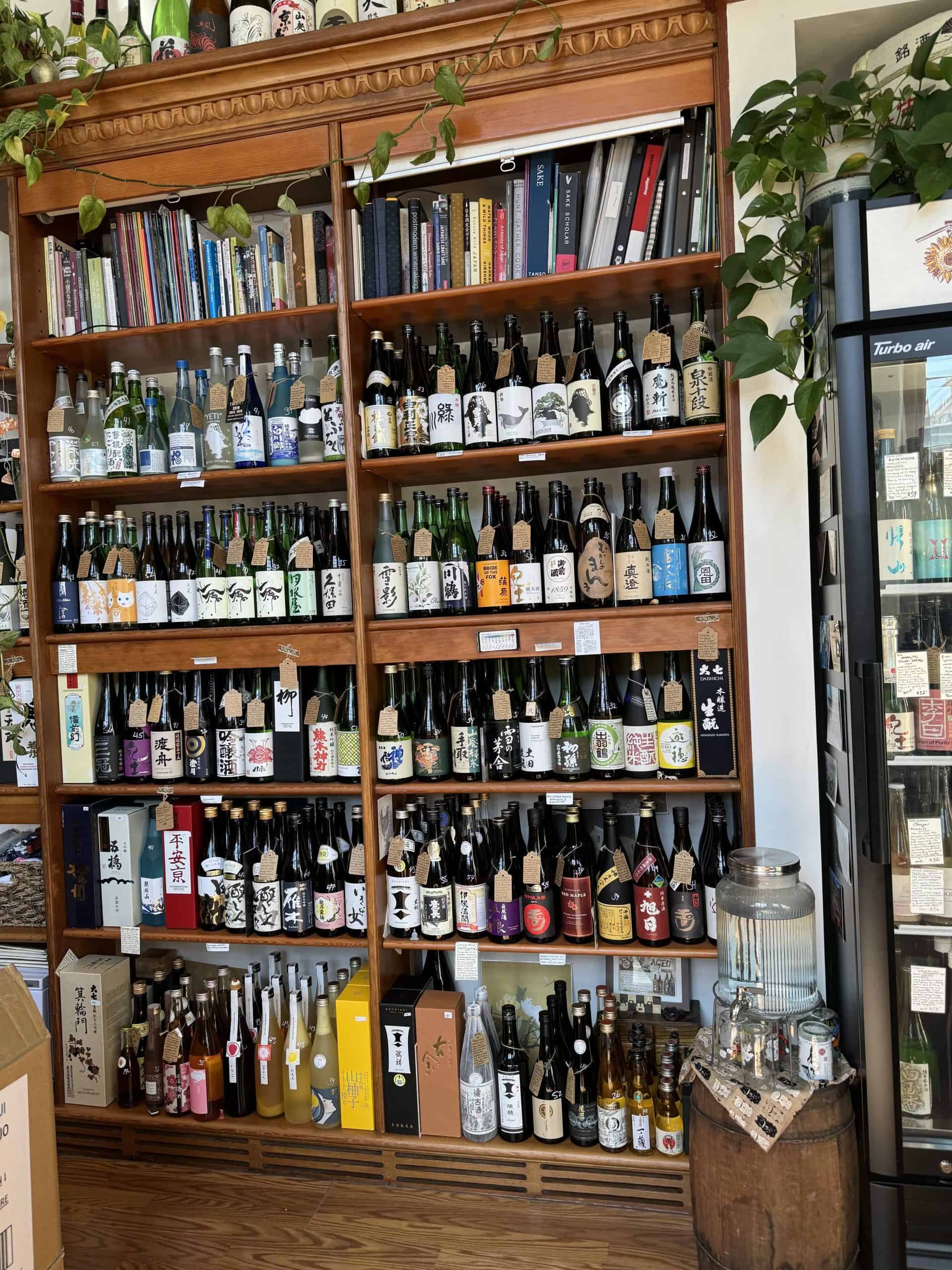
Level Up Your Business Today
Join the thousands of people like you already growing their businesses and knowledge with our team of experts. We deliver timely updates, interesting insights, and exclusive promos to your inbox.
Join For FreeNina Murphy's adorable 250-square-foot sake shop and tasting room in SE Portland is a beverage-lover's dream.
On day one of Main Street Mavericks, Nina Murphy’s SE Portland sake shop was stop four on a road trip around Oregon to meet small business owners. Nestled just one block away from the South Eastside waterfront, Sunflower Sake is a sake shop and tasting room. But Murphy’s visions for Sunflower Sake go beyond a simple tasting room — she is bringing sake education to life in a vibrant city of beverage connoisseurs.
We sat down with Nina to talk business. And sake.

So, my name is Nina Murphy. I own Sunflower Sake, which is a tiny little 250-square-foot sake specialty store. I also sell online, and I teach classes. I do sake education. I do promotion.
And all of this started when I was in the wine industry. So a long, long time ago, 10 years ago, I was in insurance, and I did mostly account management, and I really loved the side of that, that was like consulting, helping people, and building relationships. And then, at some point, I felt like I wanted to pursue something I actually felt passionate about.
I was in love with food, and in love with wine, and that whole culture — the geography and history. Eventually, in COVID, I pivoted to sake.
I love both equally. I’m still a major wine lover. And in fact, in Japan, whenever I visit, I go to wineries as well. They have a really cool wine culture, but sake felt like an opportunity to support an industry that’s really, really struggling.
Sake is at an all-time low in market share in Japan, and it’s a really wonderful historical and traditional industry that really deserves to be supported. More people should know about it! So, opening up Sunflower was a way for me to connect with that, to have an excuse to go to Japan on the regular, and also to promote a wonderful and richly important historic beverage that deserves everyone’s attention.
I feel not qualified to give any advice whatsoever, but in my personal experience, having started as a pop-up first in a shipping container in an alley in winter, with outside seating only in Portland winter, that was incredibly difficult, and it did teach me some lessons that I carried on here. Also, before I started, I consulted with a lot of other small wine shops and small businesses in Portland, as well as friends of mine that I worked with when I was in wine and when I was selling wine.
And they were kind enough to tell me to keep it small. Especially in COVID era, there was a sense that things were going to go down again. There was a lot of being unsure. And at the time, I was potentially looking at a main street shop location that needed full build-out. That was 600 square feet, but even that would have required some employees and major funds to open.
And so, thankfully, I was convinced not to take on that $140,000 of debt, which was the estimated build-out. And I was encouraged to find something smaller. I held out, and I found this place, which is 250 square feet in an old building, not in a very walkable neighborhood, but it is a neighborhood with a lot of character.
And so people come here for experiences.
My top piece of advice is to keep it small.
My top piece of advice is to keep it small. I can afford the rent on 250 square feet, even if I have a bad month, which is going to happen, and also I don’t need to take out a huge loan. If I need to grow, and I have needed to grow, I’ve been able to call on affordable, month-to-month, local cold storage facilities in this immediate area. If I need more inventory or I need to flex into a slightly different business model, there are resources around me that I can pick up on to do that without completely breaking the bank and putting myself in a really tough position when things get quiet.

The best part of being a small business owner is that I wake up every day, extremely excited about certain projects. I say certain projects because there are some things that I hate doing, and I’m really terrible at them, and I have a to-do list that’s a mile long.
But there are so many projects on that list that are positively thrilling to work with. For instance, one of the things that I do is run a sake club. It’s a subscription-based, quarterly, and monthly club. That is my excuse to get to paint watercolor art, which is another one of my passions, cook and practice food pairings, and even draw things like comics and write up long, way too detailed backstories about certain sake bottles.
That’s the kind of thing that I would do in my free time, willingly, unpaid. Just let me do it.
And so I’ve been able to structure the business where that is a part of my everyday work. That’s not something that would be easy to get in most other work. I think that the best part of being a small business owner is that you can build it to be whatever you need it to be to bring you joy.
No. When you guys reached out to me, I looked a little bit at your website, tried to kind of figure out what it is that you do, and I’m definitely curious to keep looking.
Certainly, I think the biggest issue for small business owners is lack of time. You know, being able to just find the time to handle the thing that’s immediately in front of you and planning strategically for six months down the line. Now that I’m two years into my business, I feel like I’m just starting to think six months ahead. And I also run a sake festival annually.
The first year, I started planning it a month and a half ahead of time. The second year, I pretty much started planning it three months ahead of time. And this year, we’re finally seven months ahead of time. So, I’m slowly learning to take a step back. And part of that is also learning how to operate my business better. And for the very first time in my life, Googling what the f$%* SEO is. (Excuse my language.) Which feels like these are important things.
Maybe you guys are part of the path to discovery!

Like any small business owner, weathering the ups and downs of a busy season versus a quiet season can be extremely difficult. For small business owners, we not only have to be proficient in the day-to-day interactions and sharing things that we love and selling things to people that we think they will love, but we also have to be proficient in marketing, website management, business finance, all this stuff.
And for most of us who got into it, this is not the background that we came from. We’re in it because we are passionate and we care about what we do, not because we are like big behemoths that have huge amounts of resources behind us.
I think one of the reasons why I love Portland and why I wanted to move here and open up a small business here is because it felt like Portlanders do support local businesses more than The San Francisco Bay Area where I grew up, more than L.A. where I spent many years. People actively seek out small businesses when they’re like, I need tea. Okay, I’m going to go to a local spot to get it. I’m not going to order it on Amazon. So it feels like Portland was always a really great place to get that support from the community.
But what I didn’t expect when I first opened the shop was how difficult it’s been to even make people aware that I exist.
It feels like to do that, I need so much mastery over so many different fields. I am not a video format kind of person. If you look at my Instagram profile, I have zero photos of myself. I’m not the kind of person who likes that sort of face time, but I know that’s what social platforms want to see and that’s what’s successful.
Balancing the two of those has been incredibly difficult. With that said, how can the community help? Just by rebroadcasting!
When you are looking around at the small businesses that you follow on Instagram or on email, even if you don’t necessarily want to go to an event or you don’t have time to go to an event, you think that maybe some of your friends would be interested, reposting it is so huge.
It makes a world of difference. Even a couple dozen reposts are enough to get at least people who would be curious to be aware that you’re out there so that even if they don’t go to that event, they know that in the future, they can Google me and be like, “Oh, I think there was a sake shop in Portland.”
It goes a really, really long way.
Portland is a city of beverage lovers and extremely knowledgeable beverage people, whether they’re professionals or just passionate. We have insane world-class coffee lovers, tea lovers, kombucha lovers. Like, where else in the U.S. do you have a mead bar, a kombucha bar, a tea bar, and a coffee bar, all within three square blocks?
On top of that, of course, our alcohol scene is really incredible, too. We have the Willamette Valley for wine. We’ve got crazy beer. And so it should be no surprise that sake has a bit of a foothold here. However, as of 2020 data, Portland was the number one consumer per capita of sake in the U.S.
So, my customers, I would say, are, on average, much more knowledgeable than the average person in the sense that they come in, and their starting place is usually not from an American stereotype of, like, low-quality hot sake served piping hot by the carafe, and it’s super cheap, and it tastes like nothing, or bad.
That’s what many of my friends in other states have to deal with.
For me, most of the people who come in are aware that sake has the potential to be good. Maybe they’ve gone to the sake brewery that we have out in Forest Grove, which has actually been promoting sake for the last 25, 30 years. Or they go to one of our amazing Japanese restaurants that has a really well-built-out sake menu.
When they come in here, they’re usually thinking, “Hey, I know that I like sake, but I don’t know anything about it. Um, is there any way I could taste some things and learn a little bit?”
So, I get to start with a group of people who are already excited, already know a little bit, and then they already have a good impression about sake, and are comfortable with the price range that Japanese sake lands in, which unfortunately can be pretty expensive just because it’s coming from Japan in a refrigerated container and it’s perishable.

Every single flight we do is customized for the person; we have no set flights, and we’re able to talk to people about their sense of taste, sometimes in the abstract, by asking them what kind of cocktail they would order, how they have your coffee, what type of like wine do they usually go for, or beer? We can take lessons that they’ve learned about their tastes from other things and apply them to sake.
And we usually have about 30 to 35 bottles open. So that gives us a lot to work with. And then we’re able to share three different pours, hopefully, all quite different, that repeat back what we heard but in the language of sake. Hopefully, that will give them a chance to explore a couple of different things while still feeling heard.
And my favorite thing to teach in that situation is let’s put your tastes into sake words. Let’s reinterpret what you just described: “I like off-dry, and I like things a little bit fruity, sparkly, and not too bitter.” And then I can say, oh, well, that sounds like you like fruity Jinmai Ginjo.
This term means this and that, and you should look for these words or these regions when you are buying sake in a restaurant because that might be a good start to go out there in the world and find sake that you love and be able to describe it.

You know, there are a lot of misconceptions, but I think one of the most prevalent ones in Portland, which I mentioned is a pretty sake-aware community, is that hot sake is bad.
With wine, you don’t get to play with temperature the way that you can with sake, where you’re experimenting with everything from frozen slushy, all the way to tea hot with the same bottle. On top of that, there’s room for infusions, blending, and, of course, pairing, and all sorts of different ways that you can play with sake that you usually can’t play with wine.
It’s kind of looked down upon to blend two wines, whereas with sake if you blend two sakes and warm them, they can become a cohesive whole.
So this is something that people are experimenting with a lot more in Japan, but we’re trying to bring it here to Portland because it’s the forefront of beverage culture. If anyone should be adopting hot sake and being aware that this is at the forefront of a trend in Japan, Portlanders should, especially since we have cold, dark winters.
What does Sunflower Sake use for its eCommerce sales and POS? Shopify
Payroll? Gusto
Get in touch with a real human being on the Merchant Maverick team! Send us your questions, comments, reviews, or other feedback. We read every message and will respond if you'd like us to.
Reach OutGet in touch with a real human being on the Merchant Maverick team! Send us your questions, comments, reviews, or other feedback. We read every message and will respond if you'd like us to.
Reach Out
Let us know how well the content on this page solved your problem today. All feedback, positive or negative, helps us to improve the way we help small businesses.
Give Feedback
Want to help shape the future of the Merchant Maverick website? Join our testing and survey community!
By providing feedback on how we can improve, you can earn gift cards and get early access to new features.
Help us to improve by providing some feedback on your experience today.
The vendors that appear on this list were chosen by subject matter experts on the basis of product quality, wide usage and availability, and positive reputation.
Merchant Maverick’s ratings are editorial in nature, and are not aggregated from user reviews. Each staff reviewer at Merchant Maverick is a subject matter expert with experience researching, testing, and evaluating small business software and services. The rating of this company or service is based on the author’s expert opinion and analysis of the product, and assessed and seconded by another subject matter expert on staff before publication. Merchant Maverick’s ratings are not influenced by affiliate partnerships.
Our unbiased reviews and content are supported in part by affiliate partnerships, and we adhere to strict guidelines to preserve editorial integrity. The editorial content on this page is not provided by any of the companies mentioned and has not been reviewed, approved or otherwise endorsed by any of these entities. Opinions expressed here are author’s alone.